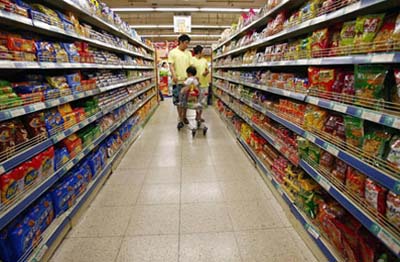Many Americans can't live without China goods
(Agencies/chinadaily.com.cn)Updated: 2007-07-22 16:40
WASHINGTON - In spite of growing US protests in about imports from China, many Americans may find it hard to manage without the range of products that dominate or in some cases monopolize the marketplace, according to an AFP report.
 Customers walk in a supermarket in Shenyang, in northeastern China's Liaoning province June 12, 2007. [Reuters]  |
Sara Bongiorni, a journalist and author of "A Year Without 'Made in China,'" which tells of a yearlong effort by her family in 2005 to avoid buying any Chinese-made products, said the experiment showed how intertwined the two big economies are.
"We can live without Chinese imports, sort of," she wrote, while adding: "Swearing off Chinese products forever seems impractical, since it might mean we'd never again buy a cell phone, a squirt gun, or one day maybe even a television. We don't want to give up those things for good."
Bongiorni said she discovered that toys, toasters and small electronics come mainly from China, as well as many other consumer goods.
During her yearlong experiment, she told AFP, "I ended up spending almost 70 dollars for tennis shoes for my son, compared to 10 or 15 dollars for those from China."
China exported some 290 billion dollars worth of products to the United States in 2006, a significant chunk of the 9.2 trillion dollars of US consumer spending.
"Chinese goods may not make up everything we buy, but they sure are a major portion," said Joel Naroff, an economist who operates a consulting firm Naroff Economic Advisors, in the the foreword to Bongiorni's book.
Naroff said that based on the data, "we should be able to live very easily without having to buy Chinese products. But that just may not be the case, especially for lower- or middle-income families."
Naroff added: "Many goods have components that are made in China but assembled elsewhere. Most manufacturers couldn't care less where the component was initially produced. They only care that it is cheap and fits their needs."
Criticism of China has risen in recent months amid growing concerns about safety.
Reports of tainted pet foods, dangerous toys, fake drugs, toxin-coated monkfish and cosmetics, drug-laced frozen eel, illicit pesticide-laden mushrooms and other products have led to recalls and bans and potentially more stringent import and food safety laws.
Made-in-China toothpaste has also been blacklisted, fearing it may contain potentially deadly chemicals reportedly found in tubes sold in Australia and elsewhere. Some farm-raised seafood products have also been banned.
|
||
|
||
|
|